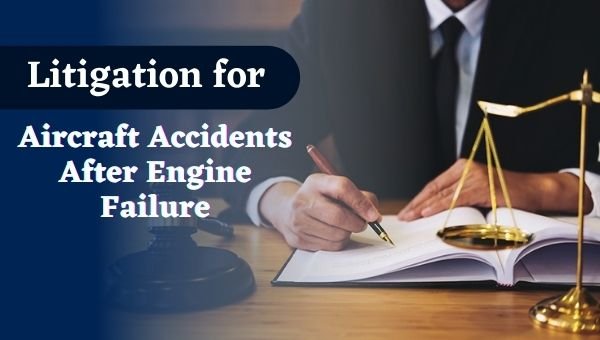Among the scariest scenario in any flight is an engine failure. Though such instances are not common, they do happen. In case of an engine failure either during take-off, flight, or landing, the plane may burst into flames. If the flight crew is not well prepared to extinguish such fire, survival chances are always slim. Though it’s not common for aircraft to catch fire, a plane on the flight is prone to many hot things that may ignite the fire.
If you are a plane accident survivor or had a loved one involved in a plane accident, learn what may have led to such an accident and who may be held responsible for injuries or wrongful death.
What Leads To Engine Failure?
No one expects a disaster when boarding a flight. If the worse happens during a flight and it’s determined that negligence was involved, the best way to fight over any injuries or losses suffered would be to look for a plane accident attorney Wasilla. Such a lawyer would help file a claim by holding the negligent defendant liable for failure to uphold a standard of care.

An engine may fail to function due to a malfunction. In most cases, mainly to large planes; the responsible parties may stop oil flow to one engine. The reason is that most planes have at least two powerful engines. This makes it possible to continue working with one engine. Engine failure may be as a result of issues such as:
- Mechanical problems: When the engine is not properly inspected, it may fail. The mechanic may fail to tighten the fuel cap or install the fuel selector valves incorrectly.
- Fuel mismanagement: One leading cause of engine failure is a clogged filter. This may cause a total shutdown to the engine. In addition, when fuel levels are not checked, this may lead to glider problems.
An airplane can still fly with an engine failure, which means that errors resulting from an engine failure may be preventable. For instance, fuel problems are inevitable. A pilot or any responsible party should access the fuel tanks to avoid issues such as fuel starvation.
Any mishap that happens due to negligence be must be accompanied by compensation. As such, you need to be aware of the people to sue for your losses.
Who May Be Responsible For Injuries
In case of an engine failure, many parties may be held responsible:
- Airline Company: This could be the failure to offer proper training especially on appropriate procedures on the use of brakes, flaps to pilots or other crew members.
- Flight crew: The reason is that it’s extremely hard for a pilot to see the engine from the cockpit. They rely on the information provided by the crew to ascertain the extent of damage and hence take action.
- The pilot: If the pilot has the procedures to follow but takes time before implementing them, fire may erupt, and there would be no time to take action leading to a severe plane accident. In case of an engine failure, a pilot has to rely on the training and procedures quickly.
- Engine manufacturer: The engine should be designed so that if the right or the left engine fails, each can work without trying to yaw the plane to either side. The rudders should be made to counter any yaw whenever possible to ensure the aircraft remains straight to avoid losing control. For example, imagine steering a wagon with a faulty front wheel. The force would be concentrated on one side, making it difficult to keep it straight as you use more energy.
- Aircraft mechanic: Engine failure could be a result of improper maintenance. A mechanic should detect and repair engine problems and predict any failure after that.
If immediate action is not taken, the plane becomes prone to an accident. There are many ways to curb any engine failure emergency. Pilots are trained on how to use flaps, brakes propellers. If the pilot fails to use the correct procedure, then any reaction taken after that becomes untimely.
Getting Compensated
If you were involved in a plane accident and the leading cause of such was engine failure, you need a seasoned plane accident. Such a lawyer will fight for your legal rights and ensure you get all damages. Survivors or families of the deceased always expected honest answers of what led to the accident. This may be possible with the help of an aircraft accident lawyer who understands airplane accident litigations and victim assistance.
Engine failure cases of liability are not a matter of bread and butter. You need a lawyer to help you determine fault. For instance, some defendants can use the defenses available to lower their liability. Such a lawyer can help you establish that the pilot never declared the state as an emergency, or they failed to switch tanks or simply never followed the instruction on how to avoid or fix make engine failure. Whichever the cause of the accident, you can be sure to recover damages.
To learn more about your best legal options, you can ask questions during your free case evaluation.







